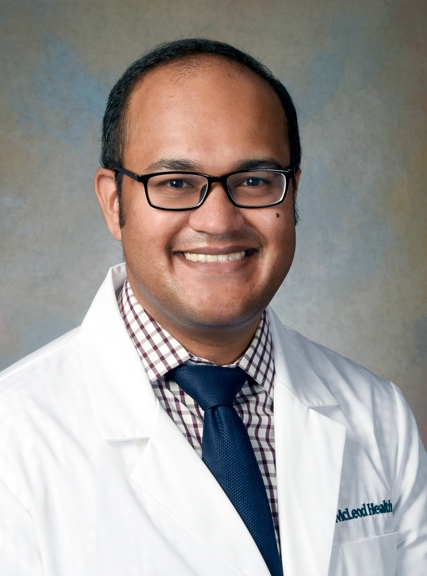Small Clip = Big Repair

Dr. Ravi Parikh
McLeod Interventional Cardiologist
Living with heart disease can affect every aspect of one’s life, physical, mental, and emotional. It can make day-to-day activities more difficult. The physicians and care teams at McLeod constantly seek innovative solutions and alternatives that allow patients to embrace life fully.
The McLeod Heart and Vascular Institute leads the way in the region with advanced therapy and treatment for one type of valvular heart disease with the MitraClip, a minimally invasive therapy to treat mitral regurgitation, also known as a leaking heart valve.
The heart has four valves, which are like one-way doors that help direct blood flow the right way through the heart. One of those valves, the mitral valve, has two leaflets, or flaps, that open and close with each heartbeat to ensure blood travels in only one direction within the heart.
Over time, the flaps on the valve can become worn and no longer seal completely, allowing blood to leak backward. As a result, the heart must work harder to push blood through the body.
Mitral regurgitation is a common condition. Approximately one in ten adults age 75 and older in the United States have some amount of mitral regurgitation. The frequency and severity of mitral regurgitation increases with age, although it can affect adults of all ages.
Common symptoms patients may experience and should discuss with their physician include:
- Shortness of breath
- Tiredness
- Dry, hacking cough
- Fainting
- Swollen feet or ankles
- Inability to exercise
- Decrease in appetite
Patients may also have an extra heart sound, known as a heart murmur, that is made when blood flows in the wrong direction. This sound would be discovered by their physician listening to the heart with a stethoscope.
Our treatment goals focus on decreasing the severity of mitral regurgitation, lessening strain on the heart, and improving quality of life for patients experiencing these symptoms. Medications may help the symptoms, but they cannot mend the damaged valve.
The current standard to repair a severely leaking worn out mitral valve remains open-heart surgery by either replacing the valve with an artificial valve or repairing the existing mitral valve. However, in patients who are not good candidates for surgery or have mitral regurgitation due to congestive heart failure, a less invasive mitral valve repair with MitraClip may be a safe and effective alternative to open-heart surgery.
An Interventional Cardiologist that specializes in structural heart disease performs the MitraClip procedures. At McLeod, we have two such specialists on staff, myself and Dr. Brian Blaker.
A heart team approach is required for patient selection. This specialized team consists of an interventional cardiologist, a cardiothoracic surgeon and a cardiac anesthesiologist, working together to determine a patient’s eligibility for this procedure. Tests to better image and measure the size of the valve help the team determine if the MitraClip is a good option for treatment.
Performed in a cardiac catheterization laboratory, this procedure uses X-ray imaging and ultrasound technology to deliver the MitraClip to the correct position in the heart via a catheter inserted through a blood vessel in the leg. Once in place, the clip attaches to the mitral valve leaflets, fastening them together. This helps to restore normal blood flow through the heart.
Clinical data from patients who underwent the MitraClip procedure demonstrate an immediate reduction of mitral regurgitation. With the MitraClip, more patients will experience improvements in their symptoms, a decreased chance of being hospitalized, and an improved quality of life.
Dr. Ravi Parikh is an Interventional Cardiologist who specializes in structural heart disease with McLeod Cardiology Associates. As part of the McLeod Structural Heart Program, Dr. Parikh is a member of the McLeod Valve Team and is also a TAVR Certified Physician. Physician and self-referrals are welcome by calling (843) 667-1891.
-
McLEOD REGIONAL MEDICAL CENTER FLORENCE
843-777-2000 -
McLEOD DARLINGTON
843-777-1100 -
McLEOD DILLON
843-774-4111 -
McLEOD LORIS
843-716-7000 -
McLEOD SEACOAST
843-390-8100 -
McLEOD CHERAW
843-537-7881 -
McLEOD CLARENDON
803-433-3000



-
McLEOD REGIONAL MEDICAL CENTER FLORENCE
843-777-2000 -
McLEOD DARLINGTON
843-777-1100 -
McLEOD DILLON
843-774-4111 -
McLEOD LORIS
843-716-7000 -
McLEOD SEACOAST
843-390-8100 -
McLEOD CHERAW
843-537-7881 -
McLEOD CLARENDON
803-433-3000
 Find a Doctor
Find a Doctor  Locations
Locations  Services
Services